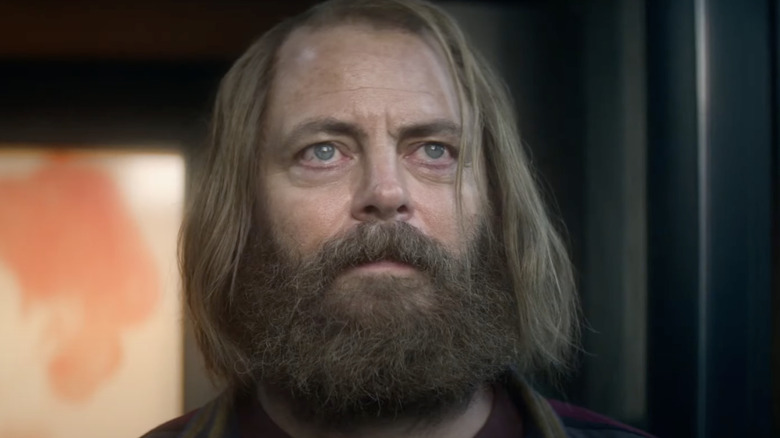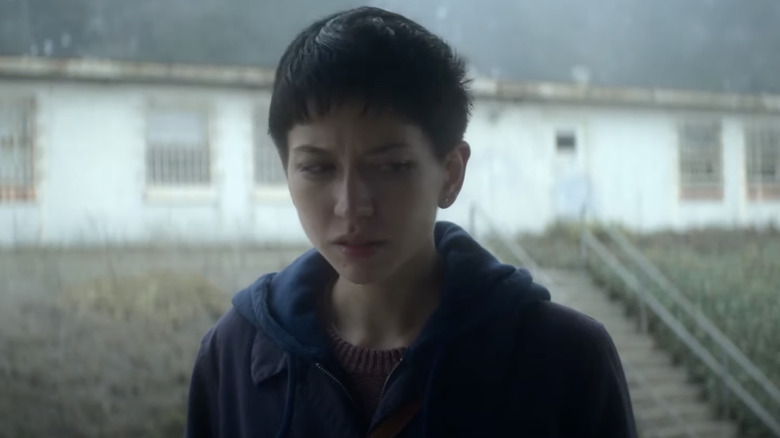Devs' Complexity Comes From One Seemingly Simple Question
This article contains spoilers for a major plot point in "Devs."
As a filmmaker, Alex Garland has shown himself adept at tackling profound questions while maneuvering between science fiction and horror, sometimes within the same movie. You can see it carried forward from his early screenwriting projects like "28 Days Later" and "Sunshine," to later directorial efforts like "Annihilation" and "Men."
In 2020, Garland made the jump to streaming TV with "Devs," an Emmy-nominated FX on Hulu miniseries starring his previous "Ex Machina" collaborator, Sonoya Mizuno, along with Nick Offerman, Jin Ha, Alison Pill, Cailee Spaeny, Stephen McKinley Henderson, Zach Grenier, Jefferson Hall, and Karl Glusman. Garland has likened "Devs" to a "broadening of 'Ex Machina,'" and the title, which takes its name from the misread name of a computer system, Deus, even plays like an extension of the movie, filling out the missing word in the phrase "deus ex machina."
The phrase, Latin for "god out of the machine," is often used in reference to the mechanics of storytelling, specifically, a plot device without organic precedent in a story that is introduced at the last minute to resolve it. In "Devs," however, Garland takes the phrase almost literally. Offerman's character says, "The universe is deterministic. It's godless and neutral and defined only by physical laws," but he has built a system that, in effect, creates God out of the machine.
Wrestling with these kinds of complex ideas is nothing new for Garland, who told Men's Health his projects usually start with an obsession of his own, which he then explores through trips to the library and discussions with friends before putting it onscreen. For "Devs," that obsession took the form of a single idea or question that Garland had begun pondering. As he put it:
"I was just trying to figure out in my own head or in conversations with friends where — if free will exists — does it reside? And it just became harder and harder to find."
'Determinism would be incredibly easy to disprove'
Alex Garland continued to Men's Health:
"For me ['Devs'] began with the realization that determinism would be incredibly easy to disprove. All you'd need to do is show something that was completely spontaneous."
This was easier said than done, however, as even seemingly simple choices like what to eat could be said to arise from cause and effect, with earlier motivations such as TV commercials, a person's last meal, and their specific tastes and dietary concerns driving them toward a specific choice. A machine that could run simulations mapping out the trajectory of causes ad infinitum would seemingly render free will null and void. The age-old philosophical question of free will versus determinism thus gave rise to "Devs" and some of its internal dramatic tensions.
"Devs" not only expands on the usual two-hour Garland story in length; it also moves beyond the single location of "Ex Machina" to a wider setting with a window into the multiverse. Paranoia about Big Tech is once again at the forefront, but this time Garland plays up the corporate conspiracy angle more.
The series falters a bit in some of its writing and acting, with Garland's dialogue and the line readings of certain actors sometimes sounding awkward or stilted. Yet its techno-thriller plot kept it watchable enough that during its initial broadcast in the early days of the pandemic, it became more of a must-see than the increasingly overplotted "Westworld" season 3 over on HBO, which aired around the same time in March 2020.
At a time when everyone is looking for a bit of escapism, "Devs" offers some gift-wrapped while asking the big existential questions, like whether or not our lives follow deterministic "tram lines" and whether or not anything ever happens without cause. And it all began with that question: If free will exists, where does it reside?

